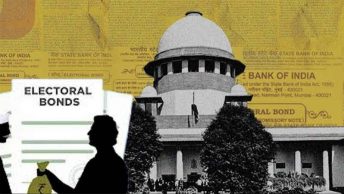Summary: This piece argues that the distinction between simpliciter and punitive termination of a probationer without granting any reasonable opportunity of hearing before termination for the former lacks a reasonable basis. It is further argued that probationers have a legitimate expectation to get the post which in turn affords them at least a reasonable opportunity of hearing, in cases of simpliciter termination.
Introduction
On September 5, 2023, the Supreme Court in The State of Punjab v. Jaswant Singh held that there is no need to follow the principles of natural justice in simpliciter termination of a probationer. In this case, a police constable on probation was discharged from service for prolonged absence from duty without any prior intimation. The plaintiff challenged this termination on the ground that no opportunity for a hearing was afforded before the termination. The Civil Judge (Jr. Division) decreed in favour of the plaintiff and directed the defendants to afford him a reasonable opportunity of hearing. This decision was upheld by the first appellate court and the High Court as well. However, the Supreme Court set aside the above decisions by reinforcing the distinction between simpliciter and punitive termination of a probationer. In this article, it is argued that the basis of such a distinction is flawed as it does not provide any sound reasoning for exempting the reasonable opportunity of hearing before termination. It is further argued that probationers have a legitimate expectation to get the post which in turn affords them at least a reasonable opportunity of hearing, in cases of simpliciter termination.
Assailing the Basis of Simpliciter-Punitive Distinction
The genesis of this distinction can be traced back to the two tests devised in Parashotam Lal Dhingra v. Union of India to decide whether Article 311 is attracted to any termination of government servants. The two tests are firstly, whether the employee has any right to the post and secondly, whether the termination has resulted in any evil or penal consequences. Upon fulfilling any of the two tests, the termination would be considered as a punishment requiring protection of Article 311 which provides for affording a reasonable opportunity of being heard in respect of the charges alleged before termination.
- The lack of Penal Consequences
The two-part test was applied in State of Orissa v. Ram Narayan Das which held that the probationer had no right to the post and termination during probation did not result in any evil consequences such as forfeiture of pay, stoppage of chance of promotion, etc. It further laid down that whether an order attracts the protection of Article 311 depends upon the “nature of inquiry” by the administrative officials. Probationers can afford this protection when an enquiry is held into any alleged misconduct or inefficieny such that the termination ensuing that enquiry is by way of punishment and puts a stigma upon the probationer. Otherwise, if there is no such enquiry before termination, i.e., if it is a case of simpliciter termination, then the protection of Article 311 is not available to the probationers. In conclusion, Article 311 is available to permanent civil servants and probationers facing punitive termination.
This theory of the “nature of inquiry” evolved into a new “motive and foundation” test, whichperforms a similar role of discovering the nature of termination. In Ravindra Kumar Misra case, the Supreme Court held that if the delinquency of a probationer is only taken as the operating motive then the order is not punitive, but when such delinauency forms the foundation of the termination order then it is punitive. Thus, it needs to be proved that the delinquency is not a mere ‘motive’ but has transformed to become ‘foundation’ for the termination to avail the protection of Article 311.
The Supreme Court in the Radhe Shyam Gupta v. U.P. State Agro Industries Corporation Ltd. case explained the “motive and foundation” test by holding that if any preliminary inquiry is conducted to assess merely the suitability of an employee and its purpose “is not to find out misconduct on the part of the officer and if a termination follows without giving an opportunity, it will not be bad.” On the other hand, where inquiry is made and evidence is received of misconduct of a definite nature and based on that misconduct a probationer is terminated then it will be punitive in nature. Here, the misconduct became the foundation of the termination and requires affording a reasonable opportunity of hearing under Article 311(2).
It is evident from such judgements that the absence of stigma in cases of simplicter termination has led courts to conclude that such instances don’t require adherence to natural law principles. However, Justice Vivian Bose in his dissenting opinion in the Parashotam Lal Dhingra case argued that owing to such a distinction”the blameless man against whom no fault can be found would be at a disadvantage. It would be anomalous to hold that a man who has been guilty of misconduct should have greater protection than a blameless individual“.The inherent contradiction is that the punishment in simpliciter termination for a minor indiscipline is greater as there is sudden discharge without any hearing. On the other hand, punitive termination with a definite misconduct (greater mischief) is given more protection, which logically should be otherwise if such distinction is to be maintained.
Additionally, making the observance of the ubiquitous natural justice principles conditional on the presence of “stigma” or “punitive nature” has no rational basis. The punitive aspect of a termination cannot be considered only in terms of misconduct, since severe financial constraints are also imposed as a consequence of simpliciter termination. Irrespective of the nature of the inquiry, the consequences of losing a job and livelihood are the same[1] for probationers, regardless of whether they face simpliciter or punitive termination.
Apart from general exceptions such as exclusion in emergency, impracticability, statutory exception, etc.,[2] there should not be any other restriction to the observance of natural justice principles. These principles provide an opportunity for the other side to make a representation that can be genuine at times. In this context, not following these principles can cause grave injustice to a blameless probationer having genuine reasons to justify the alleged indiscipline.
- The Right of Probationers to the Post
Another onerous objection to affording a reasonable hearing is that probationers have no right to the post. It is an exception to the principles of natural justice that where there is no right, there is no rule of audi alteram partem available. Although a probationer has no right to the post, it is contended that there is a legitimate expectation to get appointed to the post after the period of probation.
The Doctrine of Legitimate Expectation
The doctrine of legitimate expectation entails a fair and reasonable expectation of a fair hearing or a benefit from the administration. It eases the locus standi on an affected person to claim benefits in situations where there is no such right available for seeking remedy. In this manner, the doctrine expands the mandate to observe principles of natural justice beyond the narrow lanes of enforceable rights and protects interests that could be adversely affected by administrative actions.
Generally, there are three circumstances in which this doctrine can be enforced: firstly, where there existed a policy a person relied on but was subsequently subjected to a different policy (policy change). Secondly, a continuing practice existed but that was not applied to the case at hand (past practice change). Thirdly, a promise was made but that was dishonoured (promise change). The Supreme Court of India has held that only those expectations that are “founded on the sanction of law or custom or an established procedure followed in regular and natural sequence” can be considered legitimate. It further needs to be established that there was sufficient reliance on the practice and its non-observance caused detriment to the person.
The Apex Court has held in numerous cases that protection of legitimate expectations can be procedural or substantive in nature. Procedural protection includes a proper hearing and adherence to principles of natural justice before reaching any decision, while substantive protections guarantee that any benefit ensuing from previous policy/promise/practice will be continued if any change in them adversely affects the legitimate expectations of the people.
Justice Vivian Bose, in his dissenting opinion in Parashotam Lal Dhingra case stated that Article 311 is attracted to the probationers as well when any of their rights are infringed. But he used the term “right” in a special sense by stating that such “right” need not necessarily be justiciable or enforceable in the courts. This broader interpretation of “right” appears synonymous with “legitimate expectation”. This indicates if there is any legitimate expectation of a probationer to the post, then before its infringement, at least procedural protection such as observing the principles of natural justice must be followed.
Does A Probationer have a Legitimate Expectation to the Post?
Both probationers and temporary employees are similar in so far as neither of them has a right to the post. However, an important difference is that “a probationer is on test and a temporary employee has no right to the post“. So, the term “on test” indicates that the probationer can only be terminated if some conduct is spotted which shows the inefficiency of the probationer while the test is ongoing but not otherwise. Assessment of inefficiency or unsuitability for any job has to be impersonal and needs to be in writing for purposes of record. Further, there has to be some conduct highlighting indiscipline, inactive, lack of technical knowledge, etc., so that a reasonable opinion of inefficiency can be formed and a whimsical decision of inefficiency is prevented
Thus, a probationer who has not had any such conduct or insincereity towards the duty can reasonably have a legitimate expectation to the post. The Rajasthan High Court has also endorsed this view by holding that “By now, law is very well settled by umpteen number of judgments of the Hon’ble Supreme Court regarding the doctrine of legitimate expectation. The person who joins the service will definitely expect himself to be confirmed after the period of probation is over, if nothing wrong is found against him during the period of probation“.
However, a temporary employee who is suitable for the job and efficient enough is not guaranteed a permanent post and can suffer termination as the employee does not have any legitimate expectation to the post.
Therefore, it is contended that as a legitimate expectation exists, at least the procedural protection to the legitimate expectation needs to be afforded to the probationers. The major objection to the doctrine of legitimate expectations is that it hampers administrative freedom of discretion, which is considered essential for promoting the public interest. However, such an objection is inapplicable to procedural protection of legitimate expectation as affording a hearing procedure in no way restricts liberty of administrative discretion. Hence, it is imperative to recognize their legitimate expectation and observe principles of natural justice by affording reasonable hearing and opportunity to show cause at the least.
Conclusion
One of the core factors that propelled the growth of administrative law in India is to balance the discretionary power of administrative authorities by mandating natural justice principles in administrative functions. While this piece leaves open another question as to whether probationers should be afforded ‘substantive protection’ of legitimate expectation for further research, it is important to at least recognize the basic ‘procedural protection’ of such expectation before simpliciter termination.
Moreover, it is important to note that public employment does not stand on the same footing as private employment. Public employment is tasked with delivering essential public services like infrastructure, security, healthcare, etc. Such essential functions also demand accountability, responsibility and utmost efficiency so that people are not deprived of these public services. Therefore, to ensure such efficiency and accountability in public employment, and prevent arbitrary termination of employees, safeguards to such employees responsible for providing such services need to be added. It cannot be argued that adding such layers of protection would lengthen the procedural justice by adding costs, adding litigation, etc. Further, it is undesirable, on one hand, to harbour employees engaged in misconduct or are inefficient and, on the other hand, to inequitably terminate qualified employees in a simpliciter manner without following proper procedural justice. Thus, additional protection in public employment is essential to ensure proper procedural justice even if it comes at the cost of litigation or time owing to the vital nature of public services rendered by public employees.
[1] M.P. Jain, Principles of Administrative Law, vol 1 (7th edn, EBC 2011) 277.
[2] I.P. Massey, Administrative Law (9th edn, EBC 2017) 256-270.
Saumya Ranjan Dixit is a third year law student at the National Law University Odisha.
[Ed Note: This Article has been edited by Saranya Ravindran and published by Harshitha Adari from the Student Editorial Team.]







[…] Posted bySaumya Ranjan Dixit […]
ys5pg7